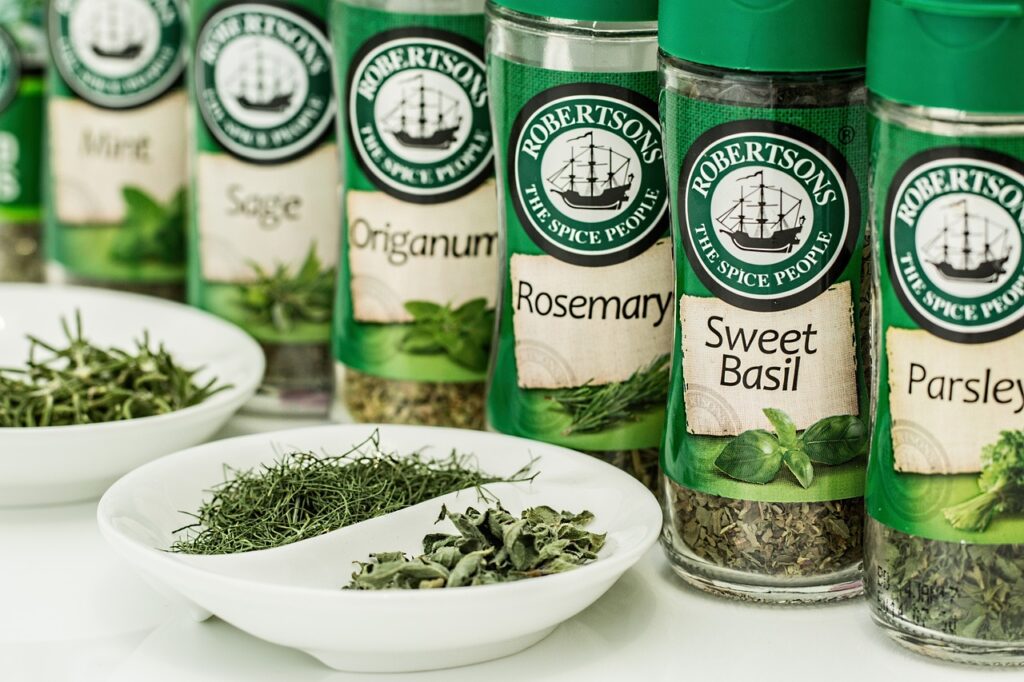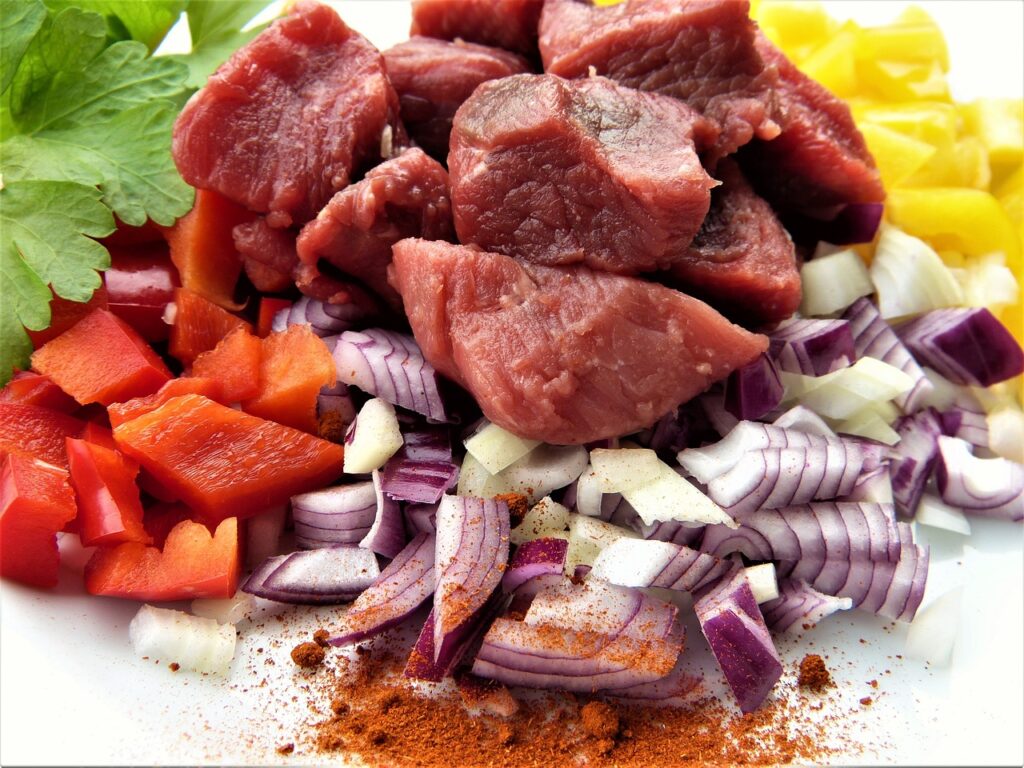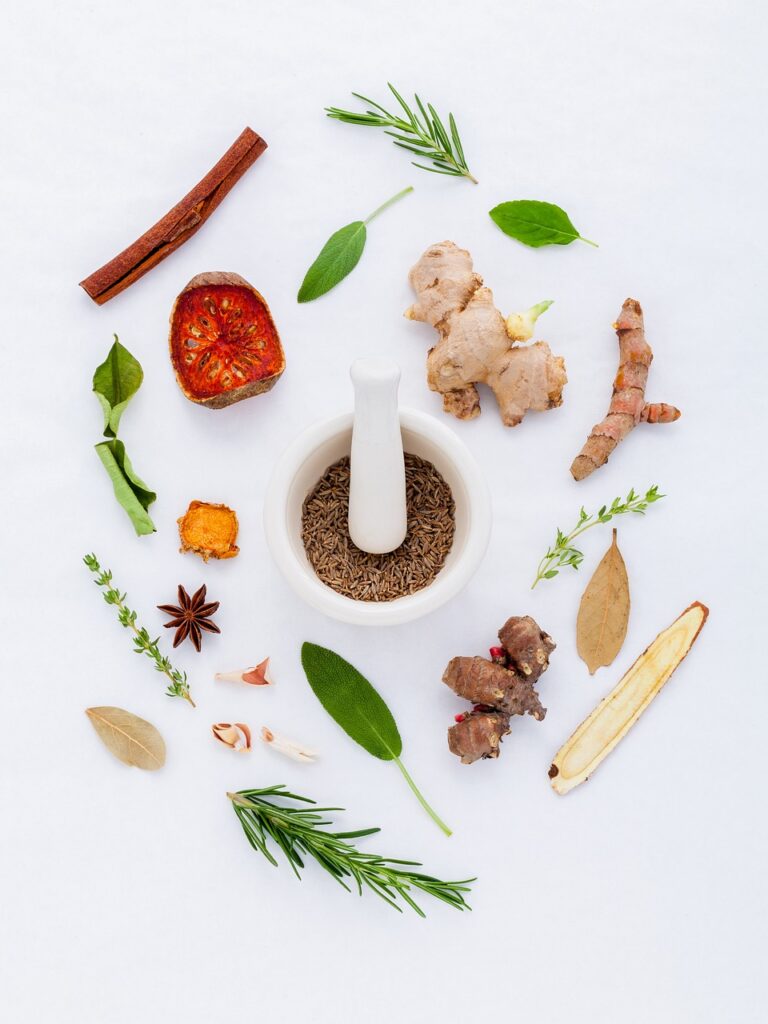Herbs be utilized to address specific dietary deficiencies commonly associated with vegetarianism.Vegetarianism has become increasingly popular for its ethical, environmental, and health-related benefits. However, while a plant-based diet offers numerous advantages, it can sometimes lead to nutritional deficiencies if not carefully planned. Essential nutrients like iron, calcium, vitamin B12, protein, omega-3 fatty acids, and zinc are commonly found in animal products, posing a challenge for vegetarians to ensure they meet their dietary needs.
This is where herbs come in as powerful allies. In this comprehensive guide, we will explore how herbs can effectively supplement a vegetarian diet, providing the essential nutrients necessary for optimal health. Whether you’re a seasoned vegetarian or someone considering adopting this lifestyle, understanding the role of herbs in balancing your nutritional intake is crucial. Let’s delve into the world of herbs and discover how they can support your journey towards a healthy, plant-based lifestyle.
Contents
- 1 Understanding Dietary Deficiencies in Vegetarianism
- 2 The Role of Herbs in Addressing Dietary Deficiencies
- 3 Herbs for Iron Deficiency
- 4 Herbs for Calcium Deficiency
- 5 Herbs for Vitamin B12 Deficiency
- 6 Herbs for Protein Deficiency
- 7 Herbs for Omega-3 Fatty Acid Deficiency
- 8 Herbs for Zinc Deficiency
- 9 Incorporating Herbs into Your Diet
- 10 Herbal Supplements vs. Whole Herbs
- 11 Consulting a Healthcare Professional
- 12 Potential Risks and Side Effects
- 13 Personal Testimonials and Success Stories
- 14 Conclusion
- 15 FAQs
Understanding Dietary Deficiencies in Vegetarianism
A vegetarian diet, which excludes meat, poultry, fish, and animal-derived products like gelatin and rennet, offers numerous benefits such as reduced risk of chronic diseases and environmental conservation. However, it also requires careful attention to meeting one’s nutritional needs.
One of the primary concerns associated with vegetarianism is the potential for inadequate intake of essential nutrients typically abundant in animal products. Vegetarians can obtain non-heme iron from plant-based sources such as legumes, leafy greens, nuts, seeds, and fortified grains. However, non-heme iron is less readily absorbed, making it important for vegetarians to consume iron-rich foods regularly and pair them with sources of vitamin C to enhance absorption.

Calcium is vital for bone health, muscle function, and nerve transmission, but is predominantly found in dairy products. Vegetarians can obtain calcium from plant-based sources such as leafy greens, tofu, almonds, sesame seeds, fortified plant milks, and calcium-set tofu. Including a variety of calcium-rich foods in the diet is essential for meeting daily requirements, especially for individuals who avoid dairy products.
Vitamin B12, a water-soluble vitamin essential for neurological function, DNA synthesis, and red blood cell formation, is not naturally present in plant foods, so vegetarians may need to rely on fortified foods or supplements to ensure adequate intake. Protein is essential for building and repairing tissues, supporting immune function, and hormone production, but vegetarians can easily meet their protein needs by consuming a variety of plant-based sources.
Incorporating a diverse range of nutrient-dense plant foods into a vegetarian diet, along with strategic supplementation or fortified foods when necessary, can help ensure individuals meet their nutritional needs and maintain optimal health while embracing a plant-based lifestyle.
The Role of Herbs in Addressing Dietary Deficiencies
Herbs are a valuable addition to a vegetarian diet, providing essential nutrients and flavor to dishes. They are rich in phytochemicals, antioxidants, and other bioactive compounds, which not only contribute to vibrant colors and fragrances but also offer numerous health benefits. Phytochemicals have been linked to reduced inflammation, improved heart health, and cancer prevention, while antioxidants help combat oxidative stress and support overall well-being.
Herbs are versatile, allowing for creative culinary exploration. They can elevate the flavor profile of vegetarian dishes, providing depth, complexity, and nuance. They are also nutrient powerhouses, with parsley being an excellent source of vitamin K, thyme high in vitamin C, and spinach and kale rich in iron, which can help address common deficiencies faced by vegetarians.

Cultivating herbs is a sustainable and environmentally friendly way to meet nutritional needs, as it requires minimal resources and space. Whether grown in your backyard garden or sourced from local markets, herbs offer a planet-friendly solution to enhancing your vegetarian diet.
In summary, herbs are more than just flavor enhancers; they are nutritional powerhouses that can play a vital role in addressing dietary deficiencies commonly associated with vegetarianism. By incorporating a variety of herbs into your meals, you not only boost your intake of essential nutrients but also add depth, complexity, and vibrancy to your culinary creations.
Herbs for Iron Deficiency
Iron deficiency is a common issue among vegetarians due to the lack of heme iron, which is more easily absorbed by the body than non-heme iron found in plant-based foods. However, incorporating iron-rich herbs into your diet can help compensate for this difference and support optimal iron levels. Nettle, dandelion greens, and parsley are excellent examples of herbs that provide significant amounts of iron and contain other compounds that enhance iron absorption.
Nettle is a nutrient-dense herb packed with iron, calcium, and vitamin C, which enhances the absorption of non-heme iron. Dandelion greens are a rich source of iron and high in vitamin C, further supporting iron absorption. Parsley, often used as a garnish, contains notable amounts of iron, vitamin C, and other antioxidants, contributing to daily iron intake.

To maximize iron absorption, it is essential to pair these herbs with vitamin C-rich foods, such as citrus fruits, bell peppers, or tomatoes. Cooking methods can also affect the absorption of iron from plant-based sources, such as lightly steaming or sautéing vegetables containing iron. By strategically incorporating iron-rich herbs into your vegetarian diet and pairing them with vitamin C-rich foods, you can effectively support iron levels and promote overall health and well-being.
Herbs for Calcium Deficiency
Calcium deficiency is a concern for vegetarians, as dairy products are often excluded from their diets. However, several herbs provide significant amounts of calcium, making them valuable additions to a vegetarian diet. Sesame seeds are an excellent source of calcium, with just one tablespoon providing a significant portion of the daily recommended intake. Kale is a nutrient-dense leafy green vegetable that offers a host of vitamins and minerals, and adding kale to salads, smoothies, or sautés can increase calcium consumption. Tofu, a versatile soy-based product, is also an excellent source of calcium, particularly when prepared with calcium sulfate as a coagulant. Basil, rich in calcium and other essential nutrients,

can be incorporated into pasta dishes, salads, or pesto sauces to contribute to calcium intake while enhancing the taste of meals. Thyme, rich in calcium, vitamin K, and iron, can be added to roasted vegetables, soups, or marinades to infuse dishes with flavor and boost their nutritional value. Oregano, renowned for its culinary uses and medicinal properties, is a valuable addition to vegetarian dishes like pizzas, pasta sauces, and salads. Incorporating these calcium-rich herbs into meals can help mitigate the risk of calcium deficiency, and pairing them with vitamin D-rich foods or adequate sun exposure is essential. Experimenting with different herbs and culinary techniques can add excitement to meals while providing essential nutrients for optimal health.
Herbs for Vitamin B12 Deficiency
Vitamin B12, also known as cobalamin, is a crucial nutrient essential for neurological health, DNA synthesis, and red blood cell formation. It is primarily found in animal products like meat, fish, dairy, and eggs. For vegetarians who exclude these foods, ensuring adequate intake of vitamin B12 is crucial to prevent deficiency-related health issues. While herbs do not contain vitamin B12, some plant-based foods may contain traces or compounds that support its absorption. For example, nori, a type of seaweed used in sushi and Asian cuisines, may contain small amounts due to bacterial contamination or cultivation methods. However, the B12 content in nori can vary widely and may not be reliable as a sole source for vegetarians.

Some herbs and plant-based foods can support the absorption of vitamin B12 when consumed alongside B12-rich foods. For example, foods high in vitamin C, such as citrus fruits, bell peppers, and leafy greens, can enhance the absorption of non-heme iron and potentially vitamin B12. Including these foods in meals alongside B12-rich plant-based sources or fortified foods can help maximize B12 uptake.
Vegetarians, especially those following strict vegan diets, should be vigilant about their vitamin B12 intake, as deficiency can lead to symptoms such as fatigue, weakness, neurological problems, and anemia. Consulting a healthcare professional or registered dietitian can provide personalized guidance on meeting nutrient needs while following a vegetarian or vegan diet.
Herbs for Protein Deficiency
Protein is a crucial macronutrient in the body, playing a vital role in tissue building, immune function, and hormone production. Plant-based sources, such as hemp seeds, spirulina, and chia seeds, offer numerous opportunities to meet daily protein requirements. Hemp seeds are a complete protein source, providing all nine essential amino acids that the body cannot produce on its own. They also contain an ideal ratio of omega-3 to omega-6 fatty acids, promoting heart health and reducing inflammation.
Spirulina, a blue-green algae, is a complete protein source, containing up to 70% protein by weight. It is an ideal choice for vegetarians and vegans looking to boost their protein intake. It also provides essential vitamins, minerals, antioxidants, and phytonutrients, supporting overall health and well-being.

Chia seeds are tiny seeds that offer an impressive array of nutrients, including protein, fiber, omega-3 fatty acids, vitamins, and minerals. They absorb liquid and swell, creating a gel-like consistency that can be used to thicken smoothies, puddings, and sauces. They can be sprinkled over salads, yogurt, or oatmeal, or mixed into baked goods for added protein and texture.
Incorporating these protein-rich herbs into your vegetarian diet not only helps meet your daily protein requirements but also adds flavor, texture, and nutritional diversity to your meals. Experiment with different recipes and meal ideas to discover creative ways to incorporate these protein-packed herbs into your vegetarian lifestyle.
Herbs for Omega-3 Fatty Acid Deficiency
Omega-3 fatty acids are essential nutrients that the body cannot produce on its own, providing numerous health benefits such as supporting brain function, heart health, and inflammation regulation. Vegetarians can still benefit from these essential fatty acids by incorporating specific herbs and plant-based foods into their diets. One category of plant-based foods that are abundant in omega-3 fatty acids is seeds, such as flaxseeds, walnuts, and chia seeds. Flaxseeds are known for their high ALA content and antioxidant properties, making them a rich source of these fatty acids.
Walnuts are also rich in nutrients, including ALA, and can be incorporated into smoothies, oatmeal, yogurt, or baked goods to boost omega-3 intake. They also contain antioxidants and polyphenols, further enhancing their health benefits. Chia seeds are small but mighty, offering a wealth of omega-3 fatty acids, fiber, protein, and other essential nutrients.
However, the conversion of ALA into EPA and DHA is relatively inefficient in the body, so vegetarians may consider incorporating algae-based supplements or fortified foods to ensure adequate intake of these nutrients. In summary, while fatty fish are primary sources of omega-3 fatty acids, vegetarians can still obtain these essential nutrients from plant-based sources like flaxseeds, walnuts, and chia seeds. By incorporating these omega-3-rich foods into their diets, vegetarians can support brain health, heart health, and overall well-being while enjoying a diverse and nutritious range of plant-based meals.

Herbs for Zinc Deficiency
Zinc is a vital mineral that plays a vital role in the body, supporting immune function, wound healing, and DNA synthesis. Vegetarians can meet their zinc requirements by incorporating specific herbs and plant-based foods into their diets. One significant category of plant-based foods rich in zinc is seeds, such as pumpkin seeds, chickpeas, and sunflower seeds. These seeds provide substantial amounts of zinc and other nutrients beneficial for overall health.
Pumpkin seeds, also known as pepitas, are a powerhouse of nutrients, including zinc, and are easily incorporated into salads, soups, or homemade granola. Chickpeas, or garbanzo beans, are versatile legumes rich in zinc and are a staple in many vegetarian diets due to their high protein and fiber content. Sunflower seeds are another excellent source of zinc, rich in vitamin E, healthy fats, and antioxidants.
In addition to seeds, certain herbs and other plant-based foods also contain varying amounts of zinc. Including a variety of these zinc-rich plant foods in vegetarian meals ensures a balanced and adequate intake of this essential mineral. By incorporating zinc-rich foods like pumpkin seeds, chickpeas, and sunflower seeds into their diets, vegetarians can support immune function, aid in wound healing, and promote overall health and well-being.
Incorporating Herbs into Your Diet
Herbs are a versatile and simple addition to any diet, offering a burst of flavor and aroma that can transform ordinary meals into culinary delights. Whether you’re a seasoned cook or just starting out in the kitchen, adding herbs to your vegetarian diet opens up a world of possibilities. Fresh herbs are vibrant and aromatic, adding freshness and complexity to dishes like soups, salads, sauces, marinades, and even beverages. They can be used to enhance the taste and visual appeal of meals, such as adding basil to a Caprese salad or cilantro to a homemade salsa.
Dried herbs offer convenience and longevity, allowing you to enjoy the flavors of your favorite herbs year-round. They can be added to cooked dishes, baked goods, and even beverages for a burst of flavor. Examples of how to incorporate dried herbs into vegetarian cooking include sprinkled oregano over pizza, seasoning roasted vegetables with dried thyme, or stirring dried rosemary into a pot of soup.
Growing your own herbs at home is a rewarding and cost-effective way to ensure a fresh and abundant supply of herbs year-round. With countless herbs to choose from, growing your own herbs allows you to connect with nature and appreciate the joys of gardening. Experimenting with different herbs and flavor combinations allows you to unleash your creativity in the kitchen and discover new culinary possibilities.
Herbal Supplements vs. Whole Herbs
Whole herbs and herbal supplements are two main options for incorporating herbs into your diet or wellness routine. Whole herbs, which are fresh or dried herbs used in their natural form, contain a diverse array of phytochemicals, antioxidants, vitamins, and minerals that work synergistically to promote health. They offer a broad spectrum of nutrients and bioactive compounds that contribute to overall health and well-being.
Herbal supplements, on the other hand, are concentrated forms of specific herbs or herbal extracts that provide convenient and standardized doses of key nutrients or bioactive compounds found in herbs. These supplements often undergo standardization processes to ensure consistent potency and quality, making it easier to track dosage and efficacy. They can also be tailored to address specific health concerns or dietary deficiencies, providing targeted support for individual needs.
When choosing between whole herbs and herbal supplements, it is essential to consider your individual health goals, preferences, and any underlying health conditions. Opting for whole herbs in their natural form provides a broader spectrum of nutrients and phytochemicals, while herbal supplements offer convenience and targeted support. However, if you have specific dietary deficiencies or health concerns, consulting a healthcare professional is crucial. They can provide personalized recommendations based on your medical history, current medications, and individual needs to ensure safe and effective use of herbal supplements.
In summary, both whole herbs and herbal supplements have their place in supporting health and well-being. By incorporating whole herbs into your diet and using herbal supplements wisely, you can harness the power of nature to optimize your health and vitality.
Consulting a Healthcare Professional
Changes to your diet or lifestyle can significantly impact your health and well-being, especially if you have underlying health conditions or specific dietary requirements. Consulting a healthcare professional, such as a registered dietitian or nutritionist, is essential for several reasons.
- Assessment of Individual Needs: Healthcare professionals can assess your nutritional needs based on factors like age, gender, weight, medical history, and lifestyle. They can identify deficiencies or imbalances in your diet and provide personalized recommendations to address them effectively.
- Guidance on Dietary Adjustments: Registered dietitians and nutritionists can offer tailored advice on dietary adjustments to meet your specific health goals or address any health concerns. They can provide evidence-based guidance to help achieve your objectives safely and effectively.
- Monitoring of Health Conditions: Healthcare professionals can help monitor your health status, track progress, and make adjustments as needed to ensure dietary changes are beneficial and safe.
- Recommendations for Supplements: In some cases, dietary adjustments alone may not be sufficient to meet your nutritional needs, especially if you have specific deficiencies or dietary restrictions. Healthcare professionals can recommend appropriate supplements, such as vitamins, minerals, or herbal remedies, to complement your diet and support optimal health.
- Guidance for Special Populations: Healthcare professionals can provide tailored guidance and support to ensure that certain populations receive adequate nutrition for optimal growth, development, and health. By consulting a healthcare professional, you can ensure that your decisions are informed, safe, and aligned with your individual health needs and goals.
Potential Risks and Side Effects
Herbs are known for their health benefits and culinary versatility, but they can interact with medications and pose risks for individuals with certain health conditions. Some herbs may have potent effects that can interfere with the efficacy of medications or exacerbate existing health issues. It is crucial to exercise caution and seek professional guidance before incorporating herbs into your diet, especially if you are taking prescription medications or have known allergies or sensitivities.
Herbs can interact with medications by enhancing or inhibiting their effects, such as St. John’s Wort, commonly used for mood disorders, which can interact with antidepressants, birth control pills, and certain heart medications. Additionally, herbs like garlic and ginkgo biloba may interfere with blood thinners, increasing the risk of bleeding.
Allergie reactions to herbs can occur, especially in individuals with known allergies or sensitivities. Symptoms can range from mild itching and swelling to severe respiratory distress and anaphylaxis. Certain health conditions may be exacerbated by the consumption of specific herbs, such as liver or kidney disorders, hormone-sensitive conditions like breast cancer, and pregnancy and breastfeeding women.
To minimize these potential risks, it is essential to research herbs thoroughly and consult a healthcare professional before incorporating them into your diet. A registered dietitian, herbalist, or naturopathic doctor can offer personalized guidance based on your individual health status, medication regimen, and dietary preferences. They can help navigate potential risks and benefits, recommend safe dosages, and monitor for adverse effects to ensure effective and safe herbal use. By approaching herbal use with caution and seeking professional guidance, you can harness the potential benefits of herbs while minimizing the risk of adverse interactions or health complications.

Personal Testimonials and Success Stories
Personal testimonials and success stories can be a powerful motivator for individuals seeking to improve their health and well-being through dietary changes, including the incorporation of herbs into their vegetarian diets. These anecdotal accounts offer real-life experiences of positive changes in health by incorporating herbs into their diets, making the benefits of herbal supplementation more tangible and accessible.
Motivation and inspiration are also significant benefits of personal testimonials, as hearing about others’ successes can be incredibly motivating and inspiring. Scientific research is essential for understanding the mechanisms and efficacy of herbal remedies, but personal testimonials can provide additional validation of the benefits of herbal supplementation.
Pasthandled tips and advice based on firsthand experiences with herbal supplementation can be invaluable for others considering incorporating herbs into their diets, offering guidance on dosage, preparation methods, and potential side effects. Sharing personal testimonials can also create a sense of community and support among individuals exploring herbal options for improving their health.
However, it is essential to approach personal testimonials critically and recognize that individual experiences may vary. Consulting a healthcare professional or registered dietitian is still advisable before making significant dietary changes or incorporating herbal supplements, especially for individuals with specific health concerns or medical conditions. By combining personal testimonials with evidence-based information and professional guidance, individuals can make informed decisions about incorporating herbs into their vegetarian diets to support their health and well-being.
Conclusion
Herbs are a natural and effective solution for addressing dietary deficiencies in vegetarian diets. By diversifying meals and snacks with a wide range of herbs, vegetarians can meet their nutritional requirements while enjoying flavorful and satisfying dishes. Herbs can target various nutritional needs with ease, such as increasing iron intake with parsley, increasing calcium levels with kale, and providing omega-3 fatty acids with flaxseeds.
However, herbal supplementation should be approached with caution and consultation with a healthcare professional, especially if you have specific health concerns or medical conditions. Some herbs may interact with medications or pose risks for individuals with allergies or sensitivities. Incorporating herbs into a vegetarian lifestyle not only enhances the nutritional value of meals but also adds depth, flavor, and variety. By embracing the diverse and nutritious benefits of herbs, vegetarians can enjoy a vibrant and sustainable plant-based lifestyle while supporting their health and well-being.
FAQs
- Are herbal supplements necessary for vegetarians to meet their nutritional needs?
- Herbal supplements can be beneficial for vegetarians with specific dietary deficiencies, but whole herbs can also provide essential nutrients in their natural form. Consult a healthcare professional to determine if supplements are necessary for your individual needs.
- Can I grow my own herbs at home, even if I don’t have a garden?
- Yes, many herbs can be grown indoors in pots or containers near a sunny window. Popular herbs such as basil, parsley, and mint thrive in indoor environments and can be easily cultivated for culinary use.
- Are there any risks associated with consuming herbs as supplements?
- While herbs are generally safe when consumed in moderation, certain herbs may interact with medications or pose risks for individuals with specific health conditions. It’s essential to research herbs thoroughly and consult a healthcare professional before using them as supplements.
- How can I incorporate herbs into my vegetarian diet if I’m not accustomed to using them?
- Start by experimenting with small amounts of fresh or dried herbs in your favorite re
- recipes. Consider trying new herbs in familiar dishes or exploring ethnic cuisines that feature a variety of flavorful herbs and spices..
- Are there any herbs that should be avoided by vegetarians?
- Some herbs may contain animal-derived ingredients or be processed using animal products, so it’s essential to read labels carefully. Additionally, certain herbs may be contraindicated for individuals with specific health conditions or allergies. Always research herbs thoroughly and consult a healthcare professional if you have any concerns.

